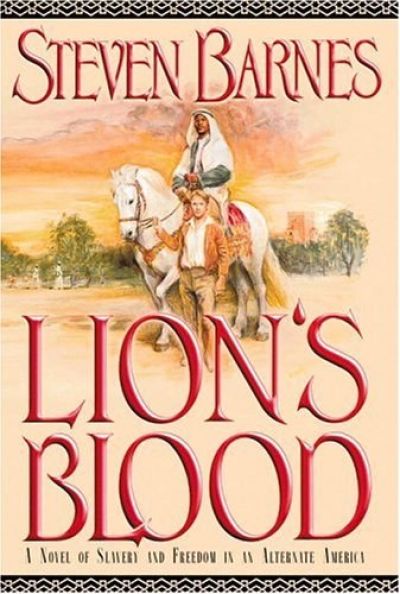Sail Away, Sail Away
Lion’s Blood (Bilalistan, volume 1)
By Steven Barnes

30 Nov, 2015
0 comments
In Steven Barnes’ 2002 novel Lion’s Blood, little Aiden O’Dere is rescued from a dismal life in a hidden Irish village when bold Viking entrepreneurs provide Aiden and those members of his village who survive the negotiation process (including his mother and his sister, but not his father) with free transportation to Bilalistan1, far across the ocean. There, the kindly Muslims provide the Irish with room and board, in exchange for such duties as their new masters deem appropriate.
Aiden proves inexplicably ungrateful, even though his new owner, the Wakil Abu Ali, is notoriously easy-going towards his property. Perhaps it’s the hard work, the beatings, the short lives many slaves face, the way slave women are used as sexual playthings, or simple white intransigence, but something about his new life does not sit entirely well with Aiden. There does not seem to be much that he can do about his situation.
Well, except
befriend Abu Ali’s son, Kai. Ingratiating himself with Kai ensures Aiden a certain degree of security that many less fortunate whites would be grateful to enjoy. Better to serve as a personal guard and companion than to work in the fields or worse, end up as one of the mayfly unfortunates sent to the mines.
As benevolent as Kai and his family see themselves, they have a habit of casually disregarding the feelings of their slaves. In particular, slave marriage and family life exists on sufferance; mothers know they may have to watch their children sold off to enrich their masters, and husbands and wives can be parted on an owner’s whim. Or, as in the case of Aiden’s wife Sophia, lost in an ill-considered bet.
With no legal recourse open to him, Aiden and his fellow slaves are forced to consider an illegal one:
Rebellion.
~oOo~
This is yet another alternate history that seems rather implausible. The implausibility is not that Europe is depicted as backward and barbaric; if you look at the span of history from the discovery of agriculture to about 1500, non-Mediterranean Europe was not exactly the shining light of the world. The notion that in some time lines it remains a haven for superstition and barbarity seems plausible enough. No, my problem has to do with the postulated point of divergence between this world and ours: a decision that Alexander the Great makes in 380 BCE. This leads to some major changes, not least of which is that Rome decisively loses the Punic Wars, resulting in a much diminished Rome. And yet there is still an Islam2 . It is even a recognizable Islam: there are Sufis. Surely all those developments would have been butterflied away by centuries of historical change.
Nothing in the Bilali treatment of slaves is particularly unrealistic: the depiction of slavery in this book is cribbed directly from history. If anything, it would have been plausible if Barnes had made his depiction far more horrific than he actually did. The thing to bear in mind is that no matter how outrageous Aiden finds his treatment, he is treated better than most of his fellow slaves. The majority of slave-owners are worse. Sometimes much worse.
Slave rebellions (and their close cousin, peasant uprisings) have been fairly frequent in the long stretch of real-world history during which slavery was widespread. (Wikipedia claims that in the US alone, there were at least 250 uprisings involving at least ten or more slaves. The US is in no way unique in this matter. The absence of slave rebellions from fiction is an odd thing. Here, Barnes again sticks fairly close to his historical models.
I know that from time to time Barnes uses his blog Dar Kush to convey various interesting statistics about American slavery3, in a effort to convince his white readers that slavery was not carried out for the benefit of slaves. Perhaps he hoped that presenting readers with a historically plausible version of slavery with whites as property and blacks as the owners would be similarly educational … but of course such efforts are futile, since the people who can take that particular lesson already have, leaving only those whose sense of self-worth is bound up in lying to themselves about history.
But fear not; this is not a heavy handed educational text. It functions perfectly well as an adventure novel. Lion’s Blood is available in a Kindle Edition. The sequel, Zulu Heart, appears to be out of print4.
1: Bilal, an African slave, was one of Muhammad’s early Meccan converts. He was tortured to force him to renounce his faith, but he refused. He had a beautiful voice and was chosen to be the first muezzin. Stan, of course, means country in Persian. Hence Pakistan (Land of the Pure) and Afghanistan (Land of the Afghans).
2: The first Islamic conquests seized the long-contested Middle Eastern battleground between the Eastern Roman Empire and Sassanid Persia. Islam was deeply influenced by both the Empires it had replaced or pushed back. If no Eastern Roman Empire, no Islam as we know it today.
For that matter, there being a Christianity without a Roman Empire makes my brain hurt.
3: Not that the stats for Canadian slavery were better.
4: It may be that 2002 was not an especially wonderful time to publish an American novel in which Islam is presented as favourably (or at least as even-handedly) as it is in this novel. It may astound modern readers to learn this but … in the early aughts there was considerable prejudice against Muslims in the USA. How times change!
